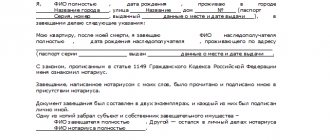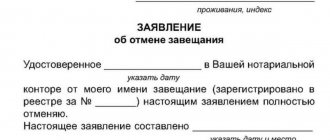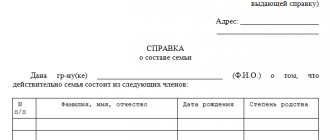What does a closed will mean?
In Art. 1126 of the Civil Code of the Russian Federation defines the concept of such a will and establishes the procedure for its execution and publication.
A closed will is a document that is kept secret until the death of the testator.
In accordance with it, the transfer of property that belongs to the owner or will belong to him in the future to other persons after his death is determined.
A closed will must be written by the testator in his own hand. The document must bear his signature. Without compliance with the specified conditions, the transaction is considered invalid and the will is invalid.
The law calls a will a unilateral transaction. In accordance with it, rights and obligations are transferred to a new person - the heir - after the death of the testator.
Unlike a gift agreement, which clearly establishes the period for the transfer of ownership, a will cannot be opened before the death of the testator.
Why might you need a closed will?
The main requirement is that a closed will must be written and signed by the testator in his own hand. When compiling the text of the document, you cannot use a computer or other technical means. This, in turn, eliminates the possibility of forgery and falsification of the inheritance.
Neither the notary nor the witnesses in whose presence the document is transferred for certification can find out the contents of the will.
Since no one knows how the citizen disposed of his property at the time of death, this guarantees the secrecy of the document.
A clear procedure has been established for the publication of the text of the will in the presence of witnesses.
Can a closed will be declared invalid?
By drawing up a closed will, the testator takes on the risk of challenging it. Such cases cannot be excluded (for example, if the order does not comply with the form established by law).
Grounds for challenging the order:
- the text of the will is typed on a computer or typewriter and then printed on a printer;
- the testator did not sign the order;
- the testator made a disposition in relation to property that does not belong to him (for example, if he signed away his property and the share of his wife);
- there are no witness signatures on the envelope;
- the testator was incompetent at the time of signing the will - which is recorded in the medical certificate from the PND.
See our material on how to draw up a statement of claim to invalidate a will?
If the will is declared invalid or void, it has no legal force. But this does not mean that the heirs will not be able to receive the property of the deceased. It’s just that in this case, the testator’s assets will go to the heirs according to the law - according to family ties. Read more about the order of inheritance in our article “Order of inheritance by law: scheme”.
Basic rules for drafting
The procedure for drawing up the will of the testator consists of two parts. Firstly, the drafting of the document itself. Secondly, transfer to the notary for certification and storage of a sealed envelope with the text of the will.
The legal requirements for the document are as follows:
- Handwritten writing.
- The presence of the signature of the initiator of the last expression of will.
- The document is placed in an envelope and sealed until it is handed over to the notary.
- The envelope is handed over to the notary in the presence of witnesses.
Since a closed will must be written and signed by the testator personally, the conclusion suggests itself that only a fully capable person who does not have vision or health problems can draw up such a document without the help of third parties.
If another person helps in composing the text, the meaning of secrecy and secrecy is lost.
The document on the disposal of property in the event of death must comply with the general rules for drawing up a will.
The text of the document must indicate:
- Full details of the testator (full name).
- Information about place and date of birth, passport details.
- List of property in respect of which the order is made.
- Distribution of all or part of the property among the heirs.
- Information about the recipients of the inheritance (in full, so that there are no difficulties with their identification).
- Date, place and time of making the will.
How does signing take place?
In addition to the person who has expressed a desire to dispose of his property, two witnesses sign the closed envelope.
Failure to comply with the form and rules of preparation entails the invalidity of the document and the procedure as a whole.
Certification procedure
The notary certifies not the text of the document, but the fact of the transfer of the sealed envelope by the testator. The envelope with the applicant's last will, which was received in the presence of witnesses, and if their signatures are present, the notary places in another envelope. An authorized person inscribes on it in the prescribed form:
- place of acceptance of the envelope (address);
- details of the notary who accepted it;
- information about witnesses present during the notarial act.
In addition to the specified information, the number according to which the information was entered into the register, a mark on payment of the state duty, the seal and signature of the notary are affixed.
After all notarial actions have been completed and the rules and requirements for drawing up a will are explained to the applicant, he is given a document confirming the fact that the notary accepted the closed will - a certificate.
Procedure for drawing up a closed will
- The author himself writes a will in free form, indicating all the necessary points. It is advisable to express your thoughts clearly, in order, so that all wishes are clear to the heirs and the notary in the future.
- The paper is signed by the author and the date of preparation is indicated. Folds into an opaque envelope, the envelope is sealed.
- In the notary's office, in addition to the author and the notary, two witnesses are present at the registration of the will. They leave their personal information and signatures on the envelope.
- The notary seals the signed copy in another envelope. It contains the following information: personal data and registration addresses of the testator and witnesses, the date of acceptance of the will, and the place of acceptance. This is done by the notary. He also reminds the author that a will that is not drawn up in accordance with the law will be considered void.
- The original of the testamentary disposition remains with the notary. The author receives a paper confirming this fact. The will is entered into the register and remains with the notary for safekeeping until the time comes for it to be made public.
Features of a closed will
In accordance with established practice, only a document written in one’s own hand can be considered correct, and therefore valid.
Since the person authorized to perform notarial acts does not see the text of the document, it is not possible to check the correctness of its execution and completion. Therefore, there is a risk that a written order for the redistribution of inheritance may be invalidated due to incorrectness, inadmissibility or incompleteness.
In this case, the inheritance will be distributed according to the law, in accordance with the general procedure. As with the execution of an open declaration of will, the testator has the right to transfer property after his death to third parties who are not his relatives or direct heirs (subject to the rules of compulsory share).
The notary to whom the inheritance document is transferred for storage records the fact of transfer.
Another important aspect is that when transferring a closed will to a notary, at least two witnesses must be present.
Who can be a witness
It is not allowed for the witnesses who are present during the transfer of the closed expression of the will of the testator to be interested persons, including his close relatives.
It is prohibited to involve incapacitated, illiterate or mentally disabled persons as witnesses.
As a rule, friends and acquaintances of the applicant are invited as witnesses. They may be persons who are not interested in the distribution of the inheritance and who have agreed to be witnesses.
Citizens present must present identification documents with a mandatory photo.
The witness, in the presence of the notary and the testator, puts his signature on the envelope with the text of the last expression of will.
Who is entitled to a mandatory share in a will?
Despite the right of the owner to dispose of the property belonging to him at the time of death at his own will, there is a portion established by law that cannot be transferred to anyone other than certain heirs. Therefore, before making a will, we recommend that you familiarize yourself in more detail with which persons can claim a part of the property without fail.
Obligatory heirs who cannot be deprived of the right to property include:
- minor child(ren), natural and/or adopted,
- disabled children, spouse,
- other dependents.
More detailed information about compulsory heirs can be found in the article “Compulsory share in a will.”
How to draw up a closed will?
Requirements for writing the text:
- It is advisable to write the text without corrections or strikethroughs. All corrections must be certified with a signature and at the end a note must be made - “the corrected text is correct.”
- The text must be handwritten and written in the handwriting of the testator himself. A printed document will be considered invalid, as will a document written in the handwriting of another person. This requirement (Article 1126 of the Civil Code) implies an examination of the authorship of the text based on handwriting.
- A will is not prohibited from being changed or annulled (Article 1130 of the Civil Code) at the request of the testator. The new document undergoes a repeated notarization procedure (protocol, envelope, signatures, certificate).
- The will must be sealed in an envelope and deposited with a notary, otherwise it will be declared invalid.
- Compulsory heirs must be taken into account when distributing shares of property. They cannot dispose of the share of the inheritance that is due to them by law. Obligatory heirs include the disabled:
- parents;
- native children;
- spouse;
- dependents for whom guardianship was granted.
Requirements for the compiler
The compiler can be any citizen of the Russian Federation who:
- is legally capable;
- adult or emancipated;
The requirements for a will impose a number of other restrictions on the testator:
- the citizen must be literate (he formulates the text himself);
- he must not have physical limitations (no arms, impaired fine motor skills, blindness) to be able to write;
- the drafter personally and in the presence of witnesses transfers a closed will to a notary (trusted persons are illegal).
Requirements for witnesses
Article 1126 of the Civil Code of the Russian Federation requires the mandatory presence of two witnesses when transferring a closed will to a notary. Persons indicated as heirs and close relatives cannot be witnesses. Witnesses must be competent and understand the significance of the procedure taking place (Article 1124 of the Civil Code).
Good to know! Witnesses place their signatures on the sealed envelope containing the will. The notary accepts this envelope and places it in the second envelope. The second envelope contains the addresses of the witnesses, their full names, place and current date. A note is written on it stating that the testator is familiar with the contents of Article 1149 of the Civil Code of the Russian Federation. A document confirming the acceptance of the will for storage in the archive must be issued.
How content is announced
After receiving the death certificate of the testator, the notary sends letters to the legal heirs notifying them of the date and time and place of proclamation of the will of the deceased relative.
The opening and reading of a closed will is carried out by a notary in the presence of two witnesses, not close relatives or possible heirs.
A note is made in the accounting book about the opening of a will, in accordance with the Rules of notarial office work, approved by Order of the Ministry of Justice of Russia dated April 16, 2014 No. 78.
A copy of the certificate remains in the notary's file.
Deadline for opening a will
No later than 15 days from the date on which the death certificate of the testator was provided, the closed will is opened by a notary in the presence of the specified persons.
At the moment the envelope is opened and the text of the will is read out, a protocol is drawn up, which is then stored in the materials of the inheritance case.
A copy of it may be issued to heirs upon request.
The protocol records the fact of opening the envelope and the announcement of the last will of the deceased, the contents of the will.
The protocol is signed by the notary and the witnesses present. The original copy of the protocol is kept by the notary.
Cancellation or modification of a will
If for any reason the testator wishes to change his will partially or completely, he has the right to do so. You can familiarize yourself with this procedure in advance and, if necessary, change the will in a legally correct form. Or cancel it altogether.
This possibility exists throughout the entire period while the testator is alive. If the will of the testator changes, the last recorded will is accepted for execution if it is properly executed.
The article “Cancelling a will, changing a will” will help you learn how to do this.
Registration cost
The costs incurred by the applicant can be calculated independently or by contacting a specialist. The calculation takes place in accordance with the tariffs that are regulated by the state and those determined by the notary himself.
The amount set by the notary may vary depending on the conditions of execution of the document and the place of its transfer.
Detailed information about the financial costs associated with registration is presented in the article “Cost of registering a will”.












